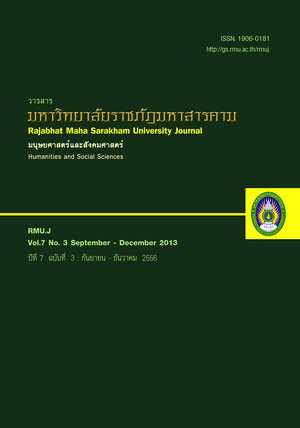การจัดการระบบเศรษฐกิจครัวเรือนไทย ตามหลักปรัชญาเศรษฐกิจพอเพียง
Main Article Content
บทคัดย่อ
บทคัดย่อ
การวิจัยครั้งนี้ มีวัตถุประสงค์เพื่อ ประการแรก ศึกษาระดับการจัดการระบบเศรษฐกิจครัวเรือนไทย ตามหลักปรัชญาเศรษฐกิจ พอเพียง ประการที่สอง ศึกษาปัจจัยแนวทางตามหลักปรัชญาเศรษฐกจิ พอเพยี ง ที่มีอิทธิพลตอ่ การจัดการระบบเศรษฐกิจครัวเรือนไทย และ ประการที่สาม เพื่อนำเสนอรูปแบบการจัดการระบบเศรษฐกิจครัวเรือนไทย ตามหลักปรัชญาเศรษฐกิจพอเพียง กำหนดวิธีดำเนิน การวิจัยเป็น 2 วิธี คือ 1) วิธีวิจัยเชิงคุณภาพ (Qualitative research) กลุ่มเป้าหมาย คือกลุ่มข้าราชการตำแหน่งผู้บริหารหรือผู้แทน การนำนโยบายไปปฏิบัติ ใน 3 กระทรวง คือ กระทรวงมหาดไทย กระทรวงพาณิชย์ และกระทรวงเกษตรและสหกรณ์และ กลุ่มผู้ บริหารหรือผู้แทนสถาบันการเงินของภาครัฐ ในราชการส่วนกลางและส่วนภูมิภาค และนักวิชาการในสถาบันการศึกษา จำนวน 15 คน ใช้วิธีการสุ่มตามความสะดวก (Convenience sampling) เก็บรวมรวมข้อมูล โดยแบบสัมภาษณ์เชิงลึกแบบมีโครงสร้าง (Structure in-depth interview) วิเคราะห์ข้อมูลโดยวิเคราะห์เนื้อหา (Content analysis) พรรณนารายละเอียด ตีความ หาความหมาย อธิบาย ความ และวิธีวิเคราะห์แบบอุปนัย (Analytic induction) และ 2) วิธีวิจัยเชิงปริมาณ (Quantitative research) ประชากรและกลุ่ม ตัวอย่าง ได้แก่ หัวหน้าครัวเรือนไทย ในจังหวัดเป้าหมายที่มีหมู่บ้านเศรษฐกิจพอเพียงตัวอย่าง จากทั้ง 4 ภูมิภาคของประเทศ จำนวน 4 จังหวัด คือ จังหวัดพระนครศรีอยุธยา จังหวัดน่าน จังหวัดหนองคาย และจังหวัดตรัง จำนวนหัวหน้าครัวเรือนไทยทั้งหมด 495 คน ได้กลุ่มตัวอย่างจำนวน 222 คน ใช้วิธีการสุ่มตัวอย่างแบบหลายขั้นตอน (Multi-stage random sampling) เครื่องมือที่ใช้ในการเก็บ รวบรวมข้อมูล ได้แก่ แบบสอบถาม วิเคราะห์ข้อมูลด้วยสถิติเชิงพรรณนา ได้แก่ ค่าความถี่ ค่าร้อยละ และค่าเฉลี่ย วิเคราะห์หาความ สัมพันธ์ของตัวแปรโดยวิธีการวิเคราะห์การถดถอยเชิงเส้นแบบพหุคูณ (Multiple linear regression analysis) และสร้างสมการ พยากรณ์ความสัมพันธ์โดยค่าสัมประสิทธิ์สหสัมพันธ์พหุคูณ (Multiple correlation coefficient) ที่ระดับนัยสำคัญทางสถิติ .05 ผลการวิจัยพบว่า
1) ระดับการจัดการระบบเศรษฐกิจครัวเรือนไทย ตามหลักปรัชญาเศรษฐกิจพอเพียง ของกลุ่มตัวอย่างครัวเรือนไทย โดย รวมค่าเฉลี่ยอยู่ในระดับสูง เรียงลำดับจากมากไปน้อย ได้แก่ ด้านสิ่งแวดล้อมที่ดีในการดำเนินชีวิต ด้านการพึ่งพาชีวิตของตนเอง และชีวิตครอบครัว ด้านสุขภาพอนามัย ด้านความรู้ และด้านรายได้ 2) ปัจจัยแนวทางตามหลักปรัชญาเศรษฐกิจพอเพียง ที่มีอิทธิพล ต่อการจัดการระบบเศรษฐกิจครัวเรือนไทย ของกลุ่มตัวอย่างหัวหน้าครัวเรือนไทย ได้แก่ ปัจจัยด้านการอนุรักษ์สิ่งแวดล้อมและใช้ ทรัพยากรธรรมชาติอย่างยั่งยืน ปัจจัยด้านระบบวิธีคิดและความเข้าใจ ปัจจัยด้านการมีส่วนร่วมของสมาชิกในครัวเรือน อายุ เพศ ปัจจัย ด้านการวางแผนทางการเงิน ปัจจัยด้านการประหยัดและอดออม ปัจจัยด้านการจัดการความเสี่ยงและควบคุมความเสี่ยงที่อาจเกิดขึ้น ในครัวเรือน และปัจจัยด้านการลดรายจ่ายและการเพิ่มรายได้ เป็นไปตามหรือสอดคล้องกับสมมติฐานของ เป็นไปตามหรือสอดคล้องกับสมมติฐานของการวิจัยที่ตั้งไว้ ค่าสัมประสิทธิ์ถดถอยในรูปคะแนนดิบ และ ค่าสัมประสิทธิ์ถดถอยในรูปคะแนนมาตรฐาน สามารถ พยากรณ์การจัดการระบบเศรษฐกิจครัวเรือนไทย ตามหลักปรัชญาเศรษฐกิจพอเพียง ได้ร้อยละ 52.70 (R2= 0.527, F= 26.253) อย่าง มีนัยสำคัญทางสถิติที่ระดับ .01 และ 3) ข้อเสนอรูปแบบการจัดการระบบเศรษฐกิจครัวเรือนไทย ตามหลักปรัชญาเศรษฐกิจพอเพียง ที่ค้นพบ คือ ปัจจัยแห่งความสำเร็จ เพื่อครัวเรือนไทย“กินดีอยู่ดี”การดำเนินงานในการส่งเสริมและสนับสนุนการจัดการระบบเศรษฐกิจ ครัวเรือน ของภาครัฐต่างๆ ที่เกี่ยวข้องสู่การปฏิบัติ ควรกำหนดปัจจัยแห่งความสำเร็จและระบบการประเมินผลการดำเนินงาน พร้อมๆ กับการพัฒนาศักยภาพของหัวหน้าครัวเรือน ด้านปัจจัยส่วนบุคคลโดยคำนึงถึงเพศ อายุ และปัจจัยแนวทางตามหลักปรัชญาเศรษฐกิจ พอเพียง ด้านระบบวิธีคิดและความเข้าใจแนวทางตามหลักปรัชญาเศรษฐกิจพอเพียง การวางแผนทางการเงิน การลดรายจ่ายและการ เพิ่มรายได้ การประหยัดและอดออม การมีส่วนร่วมของสมาชิกในครัวเรือน การจัดการความเสี่ยงและควบคุมความเสี่ยงที่อาจเกิดขึ้น ในครัวเรือน และ การอนุรักษ์สิ่งแวดล้อมและใช้ทรัพยากรธรรมชาติอย่างยั่งยืน
คำสำคัญ : การจัดการระบบเศรษฐกิจครัวเรือน, แนวทางตามหลักปรัชญาเศรษฐกิจพอเพียง
ABSTRACT
The objectives of this research are to 1) study the level of Management of Thai Household Economic System based on the Sufficiency Economy Philosophy, 2) study factors based on Sufficiency Economy Principles that impact the Management of Thai Household Economic System, and 3) present the model of Management of Thai Household Economic System based on the Sufficiency Economy Philosophy. This research methods used in this study include 1) Qualitative Research: the target groups consist of executive government officials or representatives who implement policies from 3 ministries---Ministry of Interior Affairs, Commerce Ministry, and Ministry of Agriculture and Cooperatives; executives or representatives from the public financial sector; and 15 academics from educational institutions. The Convenience Sampling Method and Structured In-depth Interview are used to collect data. Data analysis is done by using content analysis, detailed description, interpretation, defining, explanation, and analytic induction; 2) Quantitative Research: the sample population consists of breadwinners of Thai households in the four target provinces with sample sufficiency economy villages representing the 4 regions of the country: Phra Nakhon Sriayudhaya Province, Nong Khai Province, Nan Province, and Trang Province. The Taro Yamane sampling calculation formula (Taro Yamane, 1973: 727) is used to determine the number of 222 samples or subjects from 495 family leaders. A Multi-Stage Random Sampling by Stratified Random Sampling and Simple Random Sampling are also used in this survey. The research tools used for data collection are questionnaires, and the statistics used in analyzing data are Frequency, Percentage, and Arithmetic Mean. Variable relationship factors are analyzed by using Multi-linear regression and Multiple Correlation Coefficient at the .05 level of statistical significance
The research results reveal that 1) the level of the Management of Thai Household Economic System Based on the Sufficiency Economy Philosophy of household sampling is high. Arranged in a descending order these aspects are as follows: good environment for living, self- dependency and family life, health and hygiene, knowledge , and income 2) the factors based on the Sufficiency Economy Philosophy that affected the Management of Thai Economic Household System of Thai family leaders are the following: environmental conservation and sustainable natural resource, thinking system and understanding, participation of family members , age, gender, financial planning, careful spending and savings, risk management & risk control within the family, and reducing expenses and increasing incomes, which are consistent with the established research hypothesis. The value of the regression coefficient in raw scores, and standard scores can predict management of theThai Household Economic System based on the Sufficiency Economy Philosophy at 52.70% (R2=0.527, F=26.253) at the .01 level of statistical significance; and 3) suggestions and recommendations regarding the models of Management of the Thai Household Economic System Based on Sufficiency Economic Philosophy include the following: the success factor for the well-being of Thai households, implementation in promoting and supporting management of the household economic system by the concerned public sector. In addition, success factors and evaluation on implementation should be arranged with potential development of the household leaders; personal factor regarding gender and age, and factors based on the sufficiency economy philosophy,e.g.thinking method system and understanding of the sufficiency economy philosophy, financial planning, expense reduction and income increase, careful spending and savings, participation of household members, risk management and risk control within the household, and environmental conservation and sustainable natural resource consumption.
Keywords : Management of Thai Household Economic System, Sufficiency Economy Philosophy
Article Details
1. บทความที่ลงตีพิมพ์ทุกเรื่องได้รับการตรวจทางวิชาการโดยผู้ประเมินอิสระ ผู้ทรงคุณวุฒิ (Peer Review) สาขาที่เกี่ยวข้อง อย่างน้อย 3 ท่าน ในรูปแบบ Double blind review
2. ข้อคิดเห็นใด ๆ ของบทความที่ลงตีพิมพ์ในวารสารมหาวิทยาลัยราชภัฏมหาสารคาม นี้เป็นของผู้เขียน คณะผู้จัดทำวารสารไม่จำเป็นต้องเห็นด้วย
3. กองบรรณาธิการวารสารมหาวิทยาลัยราชภัฏมหาสารคาม ไม่สงวนสิทธิ์การคัดลอกแต่ให้อ้างอิงแสดงที่มา


